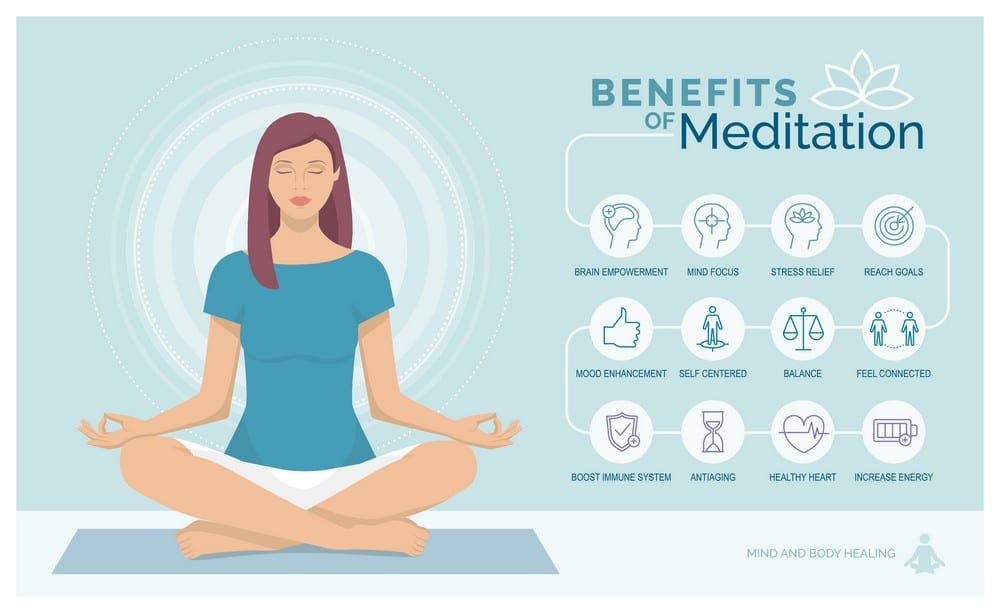Using Meditation To Lower Anxiety Levels
Published on February 18, 2020 – Last Updated on May 11, 2022
Many people, although they experience anxiety, go undiagnosed. People tend to brush off their symptoms because it seems like they are constantly feeling anxious. However, anxiety disorders can completely inhibit one’s life and make it difficult to do daily tasks.
The National Institute of Mental Health said: Because of their tendency to avoid doctors and hospitals, individuals suffering from anxiety are three to five times more likely to visit the doctor and six times more likely.
According to the Anxiety and Depression Association of America, women are twice as likely as men (18 percent vs. 9 percent) to be diagnosed with an anxiety disorder. There is evidence of a genetic link, but researchers believe that environmental factors play a role in many cases. For example, people who experience childhood trauma are more likely to have anxiety disorders.
The good news is that there are simple ways to treat anxiety symptoms, and people who do not respond well to medications can benefit from therapy, acupuncture, exercise, meditation, and other holistic treatments.
Recommended to read: best apps for anxiety.
How Meditation Can Help Treat Anxiety
Meditation has many physical benefits. For example, it reduces pain by altering neurochemical processes involved in perceiving bodily sensations (ScienceDaily). It also slows breathing rate and heart rate (a Harvard study showed the heart rhythms of long-term meditators are different from those who don’t meditate), decreases blood pressure, improves blood circulation, and lowers stress hormones like cortisol. In addition, research has shown that meditation changes brain function during the act, but the effects are lasting.
One study in Psychiatry Research: Neuroimaging showed that there were significant gray matter density increases in long-term meditators in the hippocampus. The hippocampus is an area of the brain associated with learning, memory, and emotional regulation. The amygdala, which processes fear and anxiety, was also more significant in long-term meditators who had more than 1,000 hours of practice. Other studies have shown that meditation can stimulate the production of serotonin (the “feel-good” hormone).
Anxiety Devotional
Here is a great anxiety devotional you can practice every day to lower anxiety symptoms:
- Every day, I devote five minutes to practicing deep breathing, clearing my mind, and centering myself in my being. This is an essential part of my morning meditation ritual, which helps me start the day with clarity and focus.
- I then move on to the daily affirmations that are geared specifically for that day. Finally, every evening I finish by reading what I call “Anxiety Devotional,” which are inspirational quotes from people who have also experienced anxiety in some form or another.
- I’ve realized that this process helps me deal with anxiety and has made me more conscious of how certain thoughts can bring about negative emotions like anger, jealousy, negativity, etc. So by practicing these daily rituals, I am more aware of actions that may cause me further anguish.
- By the way, I also practice gratitude every morning. When you are struggling with anxiety or depression, it’s hard to think of things you can be grateful for or bring joy into your life. Gratitude is about focusing on the positive and not just the negative thoughts that keep us trapped in a cycle of negativity.
- Daily affirmations are very powerful when used consistently because they help condition your subconscious mind to focus on certain desired behaviors, emotions, and thoughts over others. As far as meditations go, there isn’t one “best.” It’s really about finding something that works for you.
- Different people respond to different activities, so it’s best not just to follow what other people do. Instead, experiment with various practices and techniques until you find something that works best for you. If one method doesn’t work, try another until you find out what does!
I hope this anxiety devotional helps you fight the good fight.
As always, please feel free to contact me if you have questions or need further clarification on anxiety and meditation.
Anxiety Chakra Meditation
Chakras are energy centers in our bodies that help us to stay healthy. When one of the chakras is out of balance, it can cause anxiety, depression, fatigue, etc. By balancing your chakra, you will feel more relaxed and open up to other forms of healing, including meditation.
Root Chakra (Muladhara) – red color The root or first chakra is located at the base of the spine near the tailbone. This chakra governs physical energies related to security and sense gratification. The root chakra brings about feelings of survival and stability. It controls how you think about yourself, where you place your attention, and what you do with your power-. Meditation: Imagine a beautiful red flower at the base of your spine. Breathe in and pull up all of that lovely fresh energy and let it fill your root chakra, making the energy circulate through you over and over again. Know that this energy is protecting you and helping you ground to be fully present in your body. Next, make a list of things for which you are grateful.
Anxiety chakra meditation will help you stop obsessing about your problems and get you back in control. I hope you find this meditation helpful!
What is Anxiety, and How Does it Affect You?

Meditation is a natural way to release anxiety.
Anxiety is the body’s response to stress. It’s usually caused by fear and anticipation of something going wrong. This type of anxiety is typical. For example, you might have anxiety about moving to a new city or starting a new job.
However, when you have an anxiety disorder, it may keep you from doing things because the fear stays with you constantly. This type of anxiety is very debilitating.
Anxiety is one of the most common disorders and can happen at any age. However, women are more likely to be diagnosed with an anxiety disorder than men. Several conditions stem from anxiety. The diseases listed below are the most common types of anxiety diagnosed.
Obsessive-Compulsive Disorder
Obsessive-Compulsive Disorder (OCD) is an anxiety disorder where people have thoughts they cannot control. These thoughts or obsessions cause the person to have odd repetitive behaviors or compulsions. A person with OCD feels the urge to repeat these behaviors repeatedly.
People with OCD can exhibit symptoms of either obsession, compulsion, or both.
Symptoms of obsession are the thoughts or urge that cause anxiety. Some of the more common ideas are:
- Having things in perfect order- this could be in the form of organization or have a theme like an arrangement by color
- Fear of germs
- Aggressive thoughts towards themselves or other people
- Forbidden thoughts about religion or sex
The behavior that a person with OCD feels and acts out on repeatedly due to obsessive thoughts is a compulsion. Some of the compulsions seen the most are:
- Excessively washing hands or cleaning
- Putting or arranging things in an exact order
- Repeatedly checking something, like making sure the car is locked
- Having a routine that they don’t like to break
Panic Disorder
Panic attacks are episodes of intense fear that can happen at any time, anywhere, without warning. A panic attack is frightening, but it also brings on physical responses. When a panic attack comes on, a person may feel a loss of control or die. Although not life-threatening, a panic attack can be terrifying. Here are some symptoms people experience when having a panic attack.
- Nausea
- Hot flashes
- Chills
- Chest pain
- Sense of danger
- Sweating
- Trembling and shaking
- Chest Pain
The worst part of having a panic attack is the fear of having another one. There may come the point where a person avoids certain situations that trigger a panic attack.
Post Traumatic Stress Disorder (PTSD)
When there is a trauma in the past, one may still feel stress years after it happened. This is known as Post Traumatic Stress Disorder (PTSD). PTSD affects 1-3 people who have experienced severe trauma. Symptoms can be severe and impact everyday life.
Traumatic events may include:
- Physical or sexual abuse
- Sexual assault
- Very bad car accident
- Being involved in a mass shooting
- Serving in a military war zone
It doesn’t matter how long ago the incident happened, and the stress affects the person in the present. You may be more susceptible to getting PTSD if you have had depression or anxiety in the past or don’t support your family or friends.
When experiencing stress from a past event, people can suffer from:
- Nightmares
- Flashbacks
- Repetitive images or sensations
- Trembling, feeling sick, pain
PTSD, like panic disorder, can cause someone to avoid situations that trigger PTSD.
Although medication helps control some of the symptoms, many people don’t respond well to the medication. You may need to find alternative ways to help manage the symptoms of an anxiety condition. Unfortunately, some people turn to unhealthy ways of coping. There is, however, a healthy way to manage the symptoms of anxiety disorder, and that’s meditation.
How Meditation Helps with Anxiety

Relaxed, you can enjoy life.
You may have heard that meditation can help with anxiety. This is true; however, it may not help the way you think. Meditation is not a quick fix to relieve stress or anxiety. It takes a little time for meditation to start working.
Anxiety usually comes from thinking about the past or the future. Meditation keeps you in the present and concentrates on the here and now.
Keeping you in the present is just one benefit of meditation. Did you know that meditation can also change your brain?
Cortical Thickness
Researchers found in a study done in 2005 that meditation changed cortical thickness. The study consisted of 20 participants who used mindful meditation or yoga daily and attended at least one meditation retreat. The control group consisted of participants who did not practice meditation or yoga.
The results noted that the distribution of cortical thickness was different in the meditation group compared to the control group. This study showed that meditation improved the brain’s experienced-based plasticity. What that means is your brain can rewire itself!
Another study also found that participants that took part in 8 weeks of Mindfulness-Based Stress Reduction (MBSR) increased their brain matter in four different areas.
This is significant because if your brain can change how it responds, it can handle the anxiety that stress brings differently than before beginning a meditation practice by decreasing negative emotions.
Brain’s natural skill of regeneration
The hippocampus has been smaller in people who have PTSD. The amygdala, which is involved with feelings of fear, stress, and anxiety, also responds differently. Meditation helps the hippocampus gain brain matter, and the amygdala reacts differently to stress.
This is revolutionary because by mindfully meditating daily, you can eventually control the feeling of anxiety; it will no longer control you.
A researcher at Martinos Center of Biomedical took MRIs, which take pictures of the brain and record brain activity. She found by following participants over two months that the effects of meditation stay with an individual after the meditation session has ended.
Brain activity was monitored from the beginning of the two months before participants learned meditation until the end after meditating. She found changes in the amygdala, the emotion center of the brain. The amygdala did not react the same as before the meditation practice started. Instead, it stayed in a state of calm.
How Do I Start Meditating?

A life without anxiety
Meditation is an alternative way to manage conditions such as anxiety. However, therapy can be expensive and may require demanding time commitments. Medications may help manage symptoms, but they come with undesirable side effects, including addiction, depending on the pill.
Do not stop your medications from starting meditation if you have severe anxiety. Instead, use meditation as a complementary addition to managing your stress. You may find in time, after meditating regularly, you can reduce or stop taking medications for anxiety with the help of your doctor.
Mindful meditation is a practice that you build on. Like anything healthy, it is a habit that needs to be built into your lifestyle.
Meditation can not only help with anxiety, but it also helps:
- Relieve stress
- Lower blood pressure
- Help with conditions related to stress
- Helps with relaxation and sleep
- Emotional well being in general
Meditation allows the brain to take a break. When you meditate, you concentrate on the here and now. You try to clear your mind. Thoughts will arise that will intrude on which you acknowledge and let go. You focus on how your breath feels moving through the body.
Although this sounds simple, it profoundly affects the mind and the body. For example, when you experience chronic stress or don’t get enough sleep, your body suffers, and many chronic health conditions can develop, including anxiety.
Starting a meditation practice is not difficult, but it does take a commitment. You may even begin to notice changes within a week or two.
Meditation really helps to reduce or eliminate anxiety

Find out the best meditation benefits on anxiety.
One change you may notice quickly is a more positive mood. Before you know it, things that bothered you now don’t worry you as much anymore.
One of the best ways to get started is a guided meditation app. Guided meditation apps help you keep your focus when you choose to meditate. Guided meditation helps keep you on track by bringing you back to your focus throughout the meditation.
You can start with short meditations for 5 minutes and move up to longer meditations when you are ready.
Mind Tastik can help you start your meditation practice or enhance your current one. In addition, the app can help you guide your negative thoughts to positive thoughts and help sidetrack the negative fears that give you anxiety.
Meditation can be a powerful tool in managing conditions such as anxiety. By starting a meditation practice daily, you can relieve stress and change the way you think by changing how your brain works.







